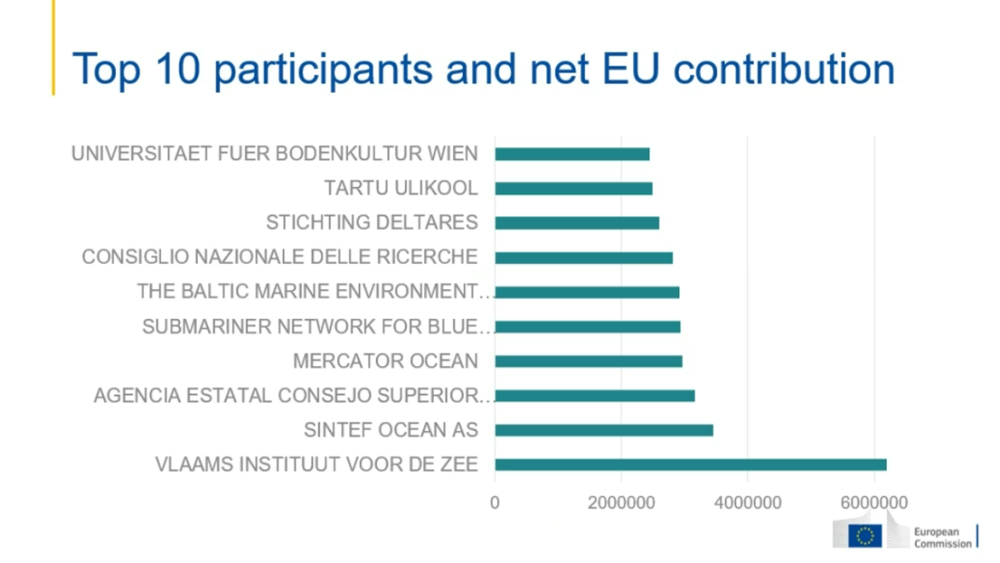VLIZ annually receives a grant from the Flemish government (department of Economy, Science and Innovation – EWI), and from the province of West Flanders. VLIZ supplements these subsidies with funding from competitive sources, ranging from Flemish and Belgian federal to European financing channels. In terms of project allocation and funding, 2023 was an exceptionally successful year for VLIZ. In 2023, VLIZ initiated or implemented a total of 144 projects and project proposals (also see KPI 7). These include 101 approved proposals and ongoing projects (in addition to 17 rejected project proposals). We are still awaiting a final decision for 26 project proposals.
A considerable part of the subsidies acquired in 2023 are European, in particular from the framework programme ‘Horizon Europe’. What’s new about the eighth framework programme is the introduction of missions, including the mission 'Restore our Ocean and Waters by 2030', also known as ‘Mission Ocean’. In this ‘Mission Ocean’, Flanders has obtained a considerable part of the participations and budget. With 9 approved projects (totalling € 6.9 million in funding), VLIZ makes a significant contribution to this success. In addition, in the whole of Europe, VLIZ is by far the most successful institute in terms of obtaining funds from Mission Ocean.

In 2023, two major HorizonEurope projects were initiated with VLIZ serving as coordinator. This is a milestone for the research institution. In June, INSPIRE (Innovative Solutions for Plastic Free European Rivers) was launched. The project is aimed at bringing together various technologies and solutions revolving around the detection, collection and prevention of litter, plastics and macroplastics in rivers and on river banks. The consortium consists of 25 partners spread across Europe and one partner from Thailand. In addition to serving as coordinator, VLIZ is responsible for the data management and the quantification of the efficiency of the actions taken to reduce the amount of plastics in the environment.
In September, DTO-Bioflow (Integration of biodiversity monitoring data into the Digital Twin Ocean) was started on the InnovOcean Campus. The project is aimed at including previously unavailable or not easily accessible data as to marine biodiversity in the biodiversity component of the EU Digital Twin Ocean. The Digital Twin Ocean is a digital representation of the ocean aimed at making knowledge about the ocean more easily available for citizens, entrepreneurs, scientists and policymakers. DTO-Bioflow is intended to ensure sustained data flows for research into marine biodiversity. The consortium consists of 30 partners from 14 countries, including research institutions, research infrastructure (e.g. EMBRC, LifeWatch), networks (MBON), organisations (ICES), global aggregators and platforms (OBIS). In addition to project coordinator, VLIZ is also the host and technical manager of the European Marine Observation and Data Network (EMODnet) portal.
Thanks to the allocation of the SUBNORDICA project in 2023, VLIZ can for the first time make use of the ‘ERC Synergy Grant’ support instruments. Such exclusive grants from the European Research Council (ERC) only go to large-scale overarching projects requiring cooperation by multiple outstanding institutions to achieve their ambitious objectives. The SUBNORDICA project will conduct an in-depth study into drowned and submerged landscapes in the North and Baltic Seas. The project is a collaboration between the Moesgaard Museum, the universities of Aarhus and Bradford, and the German research institute NIhK. Researchers from Bradford will lead the exploration in the southern North Sea together with VLIZ, the Geological Survey of the Netherlands (part of TNO) and the University of York.